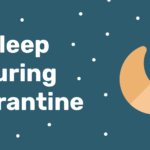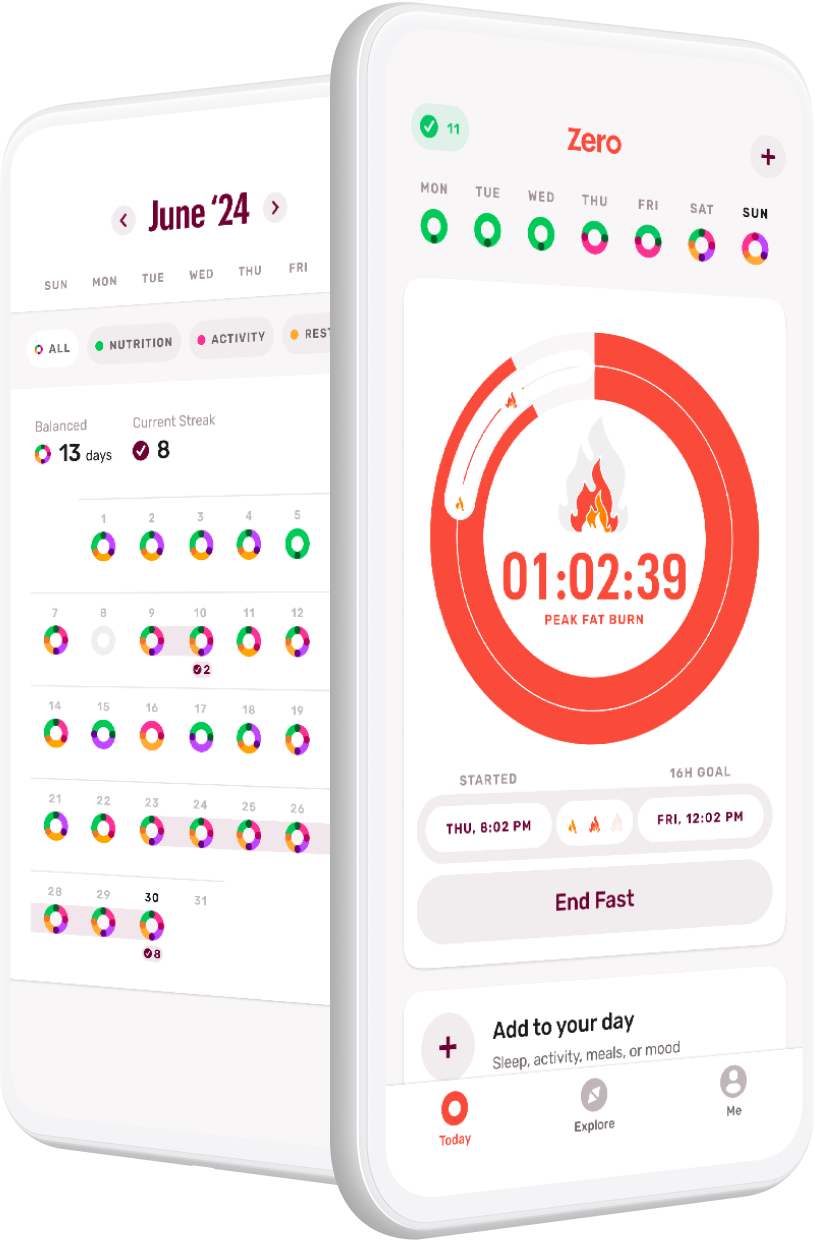Written and medically reviewed by Rich LaFountain, PhD
Intermittent fasting and sleep are normal parts of your 24-hour day. In fact, you spend approximately one third of your lifetime sleeping. Since most people don’t eat while they sleep, you can make the case that you’re also fasting (while sleeping) for roughly one third of your life. But what about those fasting hours when you’re not asleep? Do they affect what’s going on when you’re asleep? And if so: for better or for worse?
How Are Intermittent Fasting and Sleeping Connected?
Everyone sleeps, and everyone fasts for some portion of their day. These periods of fasting and sleep usually overlap. When you’re fasting and sleeping, your body is in a unique metabolic state. Combining fasting and sleeping offers your brain, body, and digestive system a necessary period of rest. Moreover, intermittent fasting and sleep are important for maintaining healthy metabolic function and keeping your body’s circadian rhythm aligned.
Humans have an innate circadian rhythm based on a 24-hour diurnal light and dark cycle that governs everything from energy production to hormone levels. You essentially have circadian clocks throughout your body, and disrupting their preferred “light = active” and “dark = rest” patterns can contribute to sleep issues, fatigue, and more serious health consequences like cardiovascular disease. Intermittent fasting is one more signal that your body uses to help keep these clocks aligned.
The Science Behind Intermittent Fasting and Improved Sleep Quality
Intermittent fasting is an ancient practice and involves intentionally abstaining from caloric intake. Most people practice an eating pattern where they eat every few hours from sunup to sundown, including early breakfasts and evening snacks. Such a routine limits your total time in fasting mode to almost exclusively when you’re asleep. Calorie intake from your meals shifts your body into ”fed-state” metabolism, causing your body to rely more on glucose for energy than on fat.
The problem here is that high-quality sleep involves a shift towards fat burning, so if you’re in a glucose-reliant fed state right before bed, your body isn’t primed for sleep. The good news is that the natural fat-burning state that happens during sleep also occurs when you fast — which makes intermittent fasting a viable solution. This health practice has increased in popularity in recent years as a tool for weight loss, health gain… and better sleep.
Intermittent Fasting and the Circadian Rhythm
As discussed, the circadian rhythm is the normal pattern of cellular operation your body follows throughout a 24-hour cycle. Proper circadian rhythm promotes health and longevity, whereas misaligned circadian rhythm increases metabolic disease risk and accelerates certain aspects of the aging process.
The three most important signals your body relies upon to achieve healthy circadian alignment are light, food, and movement. Your brain has a specific structure called the suprachiasmatic nucleus (SCN) that responds to food intake as well as other circadian signals and distributes a “clock setting” to internal clocks within each of your body’s cells. Being intentional about your eating schedule and your fasting period provides strong signals to your body to regulate its circadian rhythm. When you orient your intermittent fasting and sleep patterns correctly (which we’ll discuss in a moment), they have powerful synergistic effects on healthy circadian function, which results in better sleep.
Intermittent Fasting and Increased Melatonin Production
Hormones are crucial chemical messengers that help your body to perform specific functions, from managing high blood-sugar levels to smoothly transitioning your sleep-wake cycle. One important hormone that helps to regulate sleep is melatonin.
Melatonin levels typically follow a predictable pattern: They are low during active daylight hours, gradually increase after dark, and peak at night during sleep. Research suggests that melatonin levels also respond to your daily routine and ordinarily increase about two hours before your normal bedtime. However, large meals and snacks, particularly near bedtime, can disrupt this healthy pattern. Such an eating pattern raises your body temperature and delays healthy hormone shifts like the increase in melatonin that precedes a good night’s sleep. To prevent this disruption, be intentional about starting your fast 2–4 hours before bedtime. This helps your body shift into sleep mode more easily, as your body temperature and melatonin levels follow their natural circadian rhythm.
Intermittent Fasting and Human Growth Hormone
Another hormone impacted by fasting is human growth hormone (HGH). As its name suggests, HGH is involved in growth processes throughout the body, especially muscle and bone growth. In addition, HGH shifts your metabolism toward fat burning. Studies have shown that when you’re in fasting mode, HGH levels increase. As this happens, your body begins to rely more on fat for energy, which also coincides with low blood-sugar levels — all necessary for quality sleep!
Like melatonin, HGH often peaks during sleep. In humans, this occurs at specific times, usually between 11:00 p.m. and 2:00 a.m. When you’re asleep, HGH enables your body to engage in recovery and repair at the cellular level. For example, your body can attend to microtears in your muscles, which are created during exercise, thus strengthening and laying down new, healthy muscle tissue. Given that intermittent fasting can help your body better coordinate natural shifts in hormones like HGH, this eating strategy ultimately promotes healthy, restorative sleep.
Does Intermittent Fasting Cause Insomnia?
Fasting puts some stress on your body, and elevated levels of the stress hormone cortisol have been linked to poorer sleep quality. However, exercise also puts stress on your body, and it’s been shown to help improve sleep — which is to say, not all stress is bad! In fact, mild stress that is limited in duration will benefit your health and resilience over time.
In a nutshell, popular intermittent fasting strategies that involve reductions in the duration of your eating window do not contribute to insomnia. On the contrary, participants who follow intermittent fasting or time-restricted feeding (TRF) schedules that limit their eating window to less than 12 hours a day often improve sleep efficiency compared to more traditional or erratic eating patterns.
However, unlike short-term fasts, extended fasts lasting longer than 24 hours and especially fasts that last multiple days elevate cortisol and have been shown to reduce rapid eye movement or REM sleep cycles. If you’re considering an extended fast, you should be aware that fasts longer than 24 hours are more likely to disrupt your circadian rhythm, so your sleep may be affected.
4 Tips to Optimize Sleep While Intermittent Fasting
Intermittent fasting in the form of time-restricted eating — whether you fast for 12 hours or 16 hours in a given day — can help improve your circadian alignment and sleep. But you can do one better! Take these extra steps to make sure you’re getting the most out of your intermittent-fasting practice so you can wake up feeling refreshed and energetic each and every day.
Eat the Right Foods at the Right Time
Intermittent fasting influences when you eat, but what you eat is equally important to your health and your quality of sleep. Throughout the day while you’re eating and being active, focus on consuming a healthy diet consisting of whole foods; avoid prepackaged junk food whenever possible. Whole (i.e., minimally processed) foods provide high nutrient density and are less likely to contribute to your developing chronic issues like insulin resistance.
Timing matters, too. Your insulin sensitivity is higher earlier in the day, so you’ll be more responsive to carbohydrates during that time. Try to avoid processed carbohydrates (e.g., chips, crackers, sweets) in general, but especially as you get closer to your bedtime. This does not mean that you must avoid carbohydrates altogether. In fact, studies have found that a modest serving of minimally processed carbohydrates in the form of specific fruit like cherries or kiwi may decrease sleep latency and increase sleep efficiency.
Carbohydrates may influence sleep quality by helping to appropriately balance REM and non-REM sleep in addition to increasing tryptophan levels. (Tryptophan is an amino acid and a building block of melatonin.) In fact, eating tryptophan-containing foods as your last meal or snack prior to starting your fast 2–4 hours before bed is a potential sleep-promoting practice. Turkey is perhaps the most notorious tryptophan-containing food, but chicken, eggs, fish, and peanuts all provide this important amino acid.
Stay Hydrated
Studies show that when you’re well hydrated, you sleep better. Of course, this doesn’t mean guzzling copious amounts of water before bed; if you do that, you’ll likely interrupt your sleep with multiple trips to the bathroom. Instead, make sure you are prioritizing hydration throughout the day.
Not all beverages are equal when it comes to hydrating for better sleep. Beverages that contain caffeine and alcohol not only have lackluster hydration benefits, but they can also negatively impact sleep quality. Research suggests you should avoid caffeine at least six hours prior to sleep. Similarly, articles demonstrate consuming any amount of alcohol within two hours of bedtime disrupts sleep and reduces REM sleep. Instead, opt for water, seltzer, or herbal tea throughout the day, but especially as you wind down for the evening.
Experiment to Find What Works for You
There is no one-size-fits-all approach to intermittent fasting. You are unique, and so is your lifestyle; therefore, you need to experiment to find the best type of fasting and sleep arrangement that works for you. Some people prefer to begin their eating window earlier in the day, and recent research suggests that this strategy can amplify metabolic health and sleep benefits. However, if you cherish dinner and enjoy catching up with family and friends during this meal, simply adjust your intermittent fasting schedule to begin your eating window later in the day. Your intermittent-fasting practice offers many benefits above and beyond sleep, so if you need to make adjustments to better fit your schedule, don’t hesitate to make those changes.
Create a Routine and an Environment That Promote Sleep
Sleep hygiene is a term that refers to the activities you perform and the environment you are in prior to and during sleep. Creating routines that allow you to consistently prepare for sleep can increase your sleep quality.
Starting your fast a few hours before your desired bedtime is a great way to kick off an evening routine that promotes sleep. In addition to intermittent fasting, limiting your exposure to bright artificial light can help your body make a seamless sleep transition. Healthy sleep is impaired by exposure to blue light, particularly from screens like your phone, computer, or television. In the evening, as you notice the sun setting, try to reduce the amount of blue light exposure you get to improve your sleep. If you can’t avoid screens, then consider blue-light-filtering glasses in the evening. Studies show that wearing blue-light-filtering glasses can help you maintain healthy sleep despite light exposure in the evening hours prior to bed. Finally, If you want to enhance your sleep, you may also take steps to slightly reduce your body temperature and avoid any interruptions by keeping your bedroom cool, dark, and quiet.
Conclusion
While intermittent fasting is perhaps best known for being linked with fat loss and maintaining a healthy body weight, it also serves as an effective tool to enhance the quality of your sleep. This health practice requires being intentional around when you consume food (and being mindful of what you consume can help, too). By creating a routine that optimizes your eating window, you can produce positive changes in your sleep and reap the rewards of better energy levels and focus throughout the day.
Ready to start using Zero? Take the quiz or download the app today.
- Debunking 3 Myths Around Fasting and Thyroid Health - April 15, 2024
- Breaking Down Fast Breakers: How to Tell If Something Will Break Your Fast - March 4, 2024
- GLP-1s and Weight-Loss Medications vs. Lifestyle Interventions: What’s Right for You - February 5, 2024


